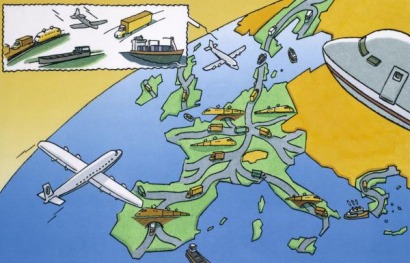
While the European Expert Group on Future Transport Fuels predicts that alternative fuels have the potential to gradually replace fossil energy sources and make transport sustainable by 2050, it highlights that there is no single candidate for fuel substitution. Fuel demand and greenhouse gas challenges will most likely require the use of a mix of fuels which can be produced from a large variety of primary energy sources. There is broad agreement that all sustainable fuels will be needed to fully meet the expected demand.
Biofuels head up a combined approach
Different modes of transport require different options of alternative fuels and the expert group’s comprehensive approach covering the whole transport sector reveals that biofuels are the only option for all forms of transport by land, water and air. The report goes on to say that biofuels will need to be used in combination with electricity from batteries suitable for short road journeys and rail transport, with hydrogen providing an alternative for medium-distance road journeys and small boats, especially on inland waterways. Synthetic fuels (increasingly from renewable resources) are put forward as a bridging option, methane (natural gas and biomethane) as a complementary fuel, and LPG as a supplement.
Fuels with higher energy density such as biofuels are touted by the group as being more suited to longer-distance operations, such as road freight transport, maritime transport, and aviation. “Biofuels could technically substitute oil in all transport modes, with existing power train technologies and existing re-fuelling infrastructures,” says the report, which adds that biomass resources can also be used to “decarbonise synthetic fuels, methane and LPG”.
First challenge: guarantee sustainability
The compatibility of new fuels with current technologies and infrastructure, or the need for disruptive system changes should be taken into account as important factors, determining in particular the economics of the different options, says the expert group. It goes on to say that while the technical and economic viability, efficient use of primary energy sources and market acceptance will be decisive for a competitive acquisition of market share by the different fuels and vehicle technologies, the sustainability of biofuels is paramount and must be guaranteed moving forward.
“According to Directives 2009/28/EC and 2009/30/EC, the carbon dioxide saved from the use of biofuels must be at least 35% of that produced from using fossil fuels,” they stress. “The production of first and second generation biofuels from both traditional crops and lignocellulosic crops requires efficient land use, and compliance with strict sustainability criteria is important.”
To this end, the report underlines that the impact of the cultivation of biofuel feed stocks on indirect land use change, “has to be addressed according to the legislative mandates in the [EC] Directives” and that “a supportive policy framework at the EU level and harmonised standards for biofuels across the EU are key elements for the future uptake of sustainable biofuels”. All biofuels that are used in the EU to fulfil its climate and energy targets need to comply with the sustainability criteria as laid down in Directives 28/2009/EC and 30/2009/EC, it suggests, while research into liquid and gaseous biofuels is still needed to reduce the carbon footprint and increase the efficiency of land use.
"If we are to achieve a truly sustainable transport, then we will have to consider alternative fuels. For this we need to take into account the needs of all transport modes," said the EC’s Vice-President, Siim Kallas, who is also responsible for transport.
The Commission is currently revising existing policies and today's report will feed into the "initiative on clean transport systems", to be launched later this year. The initiative intends to develop a consistent long-term strategy for fully meeting the energy demands of the transport sector from alternative and sustainable sources by 2050.
For additional information:
Report of the European Expert Group on Future Transport Fuels

